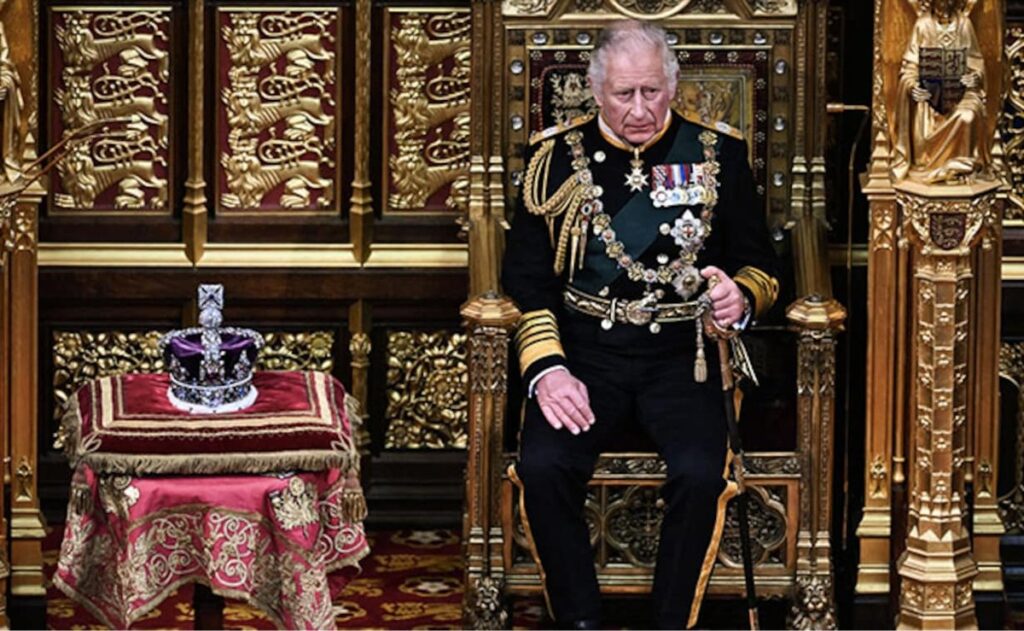Queen Elizabeth II’s death on 8 September2022, prompted celebrations of her life. People from across the globe – monarchs and presidents, artists and artisans – paid tribute. Many felt a sense of loss. Elizabeth II’s 70-year reign held together past and present. Her first prime minister, Winston Churchill, saw her great-great-grand mother Queen Victoria. Her last, Liz Truss, was born more than 20 years after Elizabeth became Queen.
During Elizabeth II’s erathere was major political, economic and social change in Britain and the world. During her reign 47 former colonies and territories became independent countries as Britain withdrew from empire. The UK became a multi-ethnic, multi-cultural nation that saw advances in women’s and LGBT rights, and life-altering changes in technology. Elizabeth II’s was the first coronation seen on television, she was the first monarch in the world to send an e-mail and one of the first to ‘Tweet’.
Queen Elizabeth II’s was a constant presence throughout these and many other developments, but she had very little, if any, influence on any of them. She did not advocate any cause or group. She was a tireless supporter of charities across the UK and the Commonwealth (an association of 56 countries that emerged from the former empire), raising an estimated £2 billion during her reign, but the Queen was not a philanthropist. She supported hospitals and educational institutions with her name, not her finances. Other than as head of state, or a celebrity, the Queen had little or no direct effect on most of her peoples’ lives. On major questions, such as the UK going to war in the Falklands in 1982 or Iraq in 2003, or joining and leaving the European Union, Her Majesty the Queen was silent.
To criticise her for this is to miss the point. The Queen knew that her job was not to say or do anything. Her job was simply to be. The British monarchy exists to exist, not to act. As the symbol of the state, the monarch is like the badge on a car, not its engine. Through ceremonial pomp the British monarchy projects prestige and identity. American and French presidents have real power, they command their military. The British monarch cannot order anyone to war, but no one else’s birthday is celebrated every year in splendour by 1500 soldiers, 200 horses and 400 musicians parading in the Trooping of the Colour.
The success of Elizabeth II’s reign lay not in the exercise of power but of the dignity and sense of duty with which she characterised the monarchy. The Queen’s dignity and sense of duty, shaped by the example of her father, George VI, and her experience of the Second World War, enabled her to remain above the embarrassing and dishonourable behaviour of some of her closest family members. Scandals involving royalty are far from new, but in the past could be kept mostly hidden. The Queen’s misfortune was to live in an age where her family’s indiscretions could no longer escape the poisonous glare, gossip and self-righteous judgements of the mass media.
The Queen’s only misstep was to misjudge the mood after Princess Diana’s death in 1997. The Queens traditional stoicism during adversity seemed cold and indifferent. Times had changed. People wanted to see humanity. In the media age, the Queen had shared her family, she was now required to share her feelings. She did so with dignity. Later, the Queen shared a joke, arriving by parachute with James Bond to open the 2012 London Olympic Games. In her final year, she shared a secret with Paddington Bear about where they kept their marmalade sandwiches.

King’s gambit
It was always going to be difficult for King Charles III to follow his mother, some fear he will fail. Charles’ failed marriage to Diana lingers in the memory and is sharpened by his testy relationship with his youngest son Harry. Worryingly, Charles also has opinions. As Prince of Wales, Charles has expressed public views on various issues, including farming, the environment, social depravation and architecture. As King, Charles has promised everyone that he will follow convention and keep his mouth shut. He probably will.
As well as the UK, King Charles is the new head of state of 14 other countries, including Australia Canada and New Zealand. Queen Elizabeth’s death will revive republican sentiment, and in the coming years several countries will probably hold referendums on keeping the British monarchas their head of state. Losing overseas realms would hurt the British monarchy, but its survival depends on the people of the UK.
The country Charles has inherited in 2022 is fundamentally different from the one his mother took over in 1952. Although no longer a great imperial power in 1952, the UK was united and playing an important international role alongside the United States following victory in the Second World War. The country was also at the start of an unprecedented 20-year period of shared economic prosperity. In 2022, the UK’s very existence is under threat as Scotland presses for another referendum on its independence. The UK’s economic model is broken with the great wealth it still creates becoming concentrated in fewer hands. Unhappy in the European Union, after leaving it, the UK continues to struggle to find its role in the world.
In a modern democracy, choosing the head of state by birth rather than merit is an anachronism. It protects hereditary social rank and privilege, acting as an institutional barrier to social mobility. As head of state, the British monarch provides no check on the government’s executive power, enabling unscrupulous prime ministers, such as Boris Johnson, to break and then rewrite their own rules. In a modern world, the monarchy should be replaced, but in the UK,a nation whose history has been entwined with royalty for 1,200 years, what would replace it? Especially when the line of succession is secure for the next two generations through Charles’ son William and his grandson George.
Charles III will never be as popular as his mother. Few people ever will be. The question is whether worsening political, economic and social tensions in the UK will threaten the monarchy during Charles reign. It is unlikely. People do not hold the monarchy responsible for their problems, nor importantly, do they expect the monarchy to solve them. The true power of the British monarchy lies in its powerlessness.


